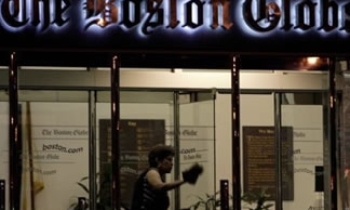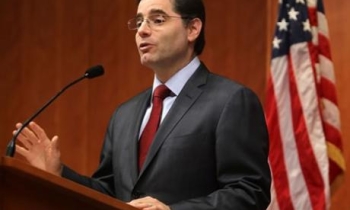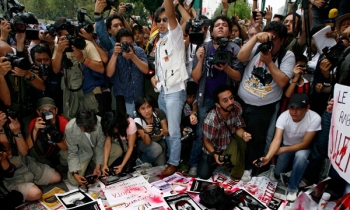Mark Thompson, the Director General of the BBC, tried to run but found that he could not hide last week. He fled to the sun for a fortnight's respite and in his absence Beeb insiders queued up to criticise the way their boss had handled the phone-in crisis that has left the corporation reeling. It was gloves off against Mr Thompson in the house journal Ariel.
BBC staffers were dismayed at the way that he had implied that the corporation was rotten to the core, calling the decision to send 16,500 employees on "honesty" training "the equivalent of teacher keeping the whole class in detention because someone has put a live frog in her handbag".
Nick Webb, of BBC Wales sport, asked whether Mr Thompson had been taking "publicity lessons from Gerald Ratner", adding: "The way the BBC itself is describing the issues involved will lead the public to believe that staff have been stealing enormously valuable prizes and sending family and friends on non-stop Caribbean cruises – not a few minor issues of ill-advisedly covering up technical problems, which might lead to the public giving a few extra pence to charities in some cases."
There's little point turning on the box at the moment when all the juicy action seems to be taking place off screen. In last week's episode of the docu-drama that is the Great British TV Phone-In Scandal, one of the main characters was killed off, leaving the rest of the cast nervously wondering who might be next.
Paul Corley, managing director of ITV's breakfast broadcaster GMTV, stole the show on Wednesday with his resignation in the wake of their own scandal, uncovered earlier this year. The scale of deception was also unveiled: 25 million phone calls worth £35m were made with no chance of winning over the past two or so years. To make amends, those duped have been offered the chance to get their money refunded. GMTV is also running 250 free prize draws, worth £10,000 a pop, and is donating £250,000 to charity.
When it comes to scalps, the difference between ITV and RDF, the company at the centre of the Queengate scandal, is that the broadcaster's executive chairman, Michael Grade, happily accepted Mr Corley's while RDF's boss, David Frank, declined the opportunity to axe his creative director, Stephen Lambert.
Pundits have pointed out that, despite breaches of editorial standards at six of its best-known shows, nobody at the BBC had paid the price. Instead, a handful of executives are on gardening leave pending an internal investigation.
Outside the BBC it was investigations all round. Mr Grade promised MPs that ITV has a "one strike and you're out" policy for anyone caught cheating their viewers. And over at Channel 4, Andy Duncan, the chief executive, has insisted that producers will not be paid if programmes were found to have deliberately deceived viewers. He is said to be confident that Channel 4's probe into its phone-ins will not uncover vast amounts of wrongdoing.









